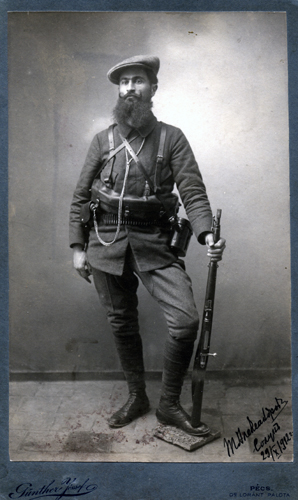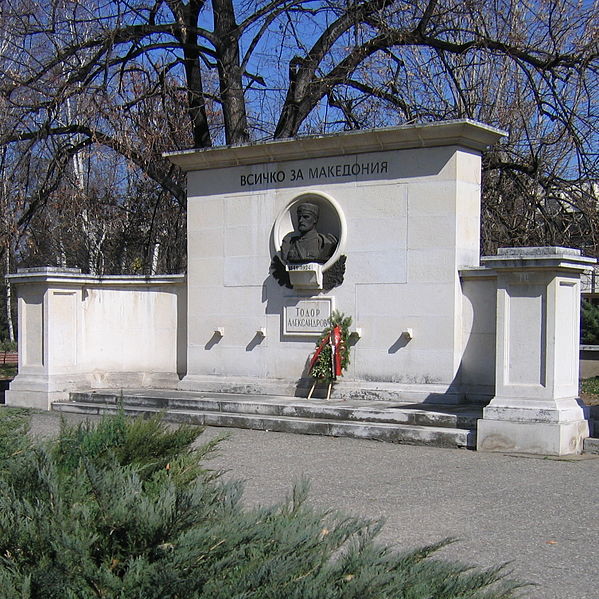<Back to Index>
- Physicist Richard Chace Tolman, 1881
- Painter Wijnand Jan Josephus Nuijen, 1813
- Bulgarian Revolutionary Todor Alexandrov Poporushov, 1881
PAGE SPONSOR


Todor Aleksandrov Poporushov also transliterated as Todor Alexandrov (Bulgarian: Тодор Александров) also spelt Alexandroff, (March 4, 1881 - August 31, 1924) was a Bulgarian freedom fighter and member of the Bulgarian Macedonian - Adrianople Revolutionary Committees (BMARC) since 1897 and later of the Central Committee of the Internal Macedonian Revolutionary Organisation (VMRO) (Bulgarian: Вътрешна македонска революционна организация ВМРО).
Aleksandrov was born in the Novo Selo suburb of Štip, present day FYR of Macedonia, to Aleksandar Poporushev and Marija Aleksandrova. In 1898, he finished the Bulgarian Pedagogical School in Skopje and became a Bulgarian teacher consecutively in the towns of Kocani, Kratovo, the village of Vinica, and Štip. He also attended the Bulgarian Men's High School of Thessaloniki.
In
1903 Todor Aleksandrov distinguished himself as an extraordinary leader
and organizer of the Kocani Revolutionary District. He was arrested by
the Ottoman authorities on March 3, 1903 and sent to Skopje under
enforced police escort during the same night. He was sentenced to five
years of solitary confinement by the extraordinary court there. In
April 1904, he was released after an amnesty. Soon afterwards, he was
appointed a head teacher in the Second high school in Shtip.
Aleksandrov, in co-operation with Todor Lazarov and Mishe Razvigorov,
worked day and night to organize the Shtip Revolutionary District. The
results of his activities were detected by the Ottoman authorities and
in November 1904 he was forbidden to teach. On January 10, 1905
Aleksandrov's house was surrounded by numerous troops but he
succeeded in breaking through the military cordon and immediately joined the cheta (band)
of Mishe Razvigorov where he became its secretary. Aleksandrov attended
the First Congress of the Skopje Revolutionary Region as a delegate
from the Shtip district. His deteriorating health led him to become a teacher in Bulgaria — the Black Sea town of Burgas in 1906, but after learning about the death of Mishe Razvigorov, he abandoned his work as a teacher and returned to Vardar Macedonia at
once. In November 1907, Aleksandrov was elected as a district vojvoda
(commander) by the Third Congress of the Skopje Revolutionary District. On August 2, 1909 the Ottomans made another attempt to arrest him but failed again. In the spring of 1910 he and his cheta traversed the Skopje region and organized the revolutionary activities. At the
beginning of 1911, Todor Aleksandrov became a member of the Central
Committee of the IMARO. In 1912, he became a vojvoda in the Kilkis and Thessaloniki districts where he carried out a number of sabotages against Ottoman targets, facilitating this way the Macedonian cause in the First Balkan War.
He supported an independent Macedonian state. In 1913, he was at the
head quarters of the Third brigade of the Macedonian Militia in the
Bulgarian army. After 1913 he organized the IMARO resistance against
other nationalities - Serbs and Greeks. On November 4, 1919 Aleksandrov was arrested by the government of Aleksandar Stamboliyski but he succeeded in escaping nine days later. In the spring of 1920, Aleksandrov went with a cheta to
Serbian Macedonia where he restored the revolutionary organization and
attracted the world's attention to the unsolved Macedonian question. At
the end of 1922, there was a bounty of 250,000 denars placed on him by
the Serbian authorities in Belgrade. In 1924 the Internal Macedonian Revolutionary Organization (IMRO) entered negotiations with the Comintern about
collaboration between the communists and the creation of a united
Macedonian movement. The idea for a new unified organization was
supported by the Soviet Union, which saw a chance for using this well developed revolutionary movement to spread revolution in the Balkans and
destabilize the Balkan monarchies. Alexandrov defended IMRO's
independence and refused to concede on practically all points requested
by the Communists. No agreement was reached besides a paper "Manifesto"
(the so-called May Manifesto of
6 May 1924), in which the objectives of the unified Macedonian
liberation movement were presented: independence and unification of
partitioned Macedonia, fighting all the neighbouring Balkan monarchies,
forming a Balkan Communist Federation and cooperation with the Soviet Union. Failing to secure Alexandrov's
cooperation, the Comintern decided to discredit him and published the
contents of the Manifesto on 28 July 1924 in the "Balkan Federation"
newspaper. Todor Aleksandrov and Aleksandar Protogerov promptly
denied through the Bulgarian press that they had ever signed any
agreements, claiming that the May Manifesto was a communist forgery.
Shortly after, Alexandrov was assassinated in unclear circumstances,
when a member of his cheta shot him on August 31, 1924 in the Pirin Mountains.
He was survived by a wife (Vangelia), son (Alexander) and daughter
(Maria). Maria Aleksandrova (Koeva) was a strong proponent of her
father's ideals and IMRO's charter.
IMRO and Alexandrov himself aimed at an autonomous Macedonia, with its capital at Salonika and prevailing Bulgarian element. He dreamed about transforming the Balkans into a federation through reconstruction of Yugoslavia into
a federal state, in which Macedonia would enter as a member on equal
rights with the other members. He took also into consideration the
decomposition of Greece and the incorporation into the autonomous
Macedonia of the Macedonian territory which was under the Greek
dominion. The part of Macedonia which was in Bulgaria should also be
incorporated into the autonomous Macedonia. His views did not indicate any doubt about the Bulgarian ethnic character of Macedonian Bulgarians. The Bulgarianness of Alexandrov is recognized by several Macedonian historians like academician Ivan Katardzhiev, director of the Historical Sciences section in the Department of Social Sciences in the Macedonian Academy of Sciences and Arts and the director of the Macedonian State archive Ph.D. Zoran Todorovski. Katardjiev defines all Macedonian revolutionaries from the
period before 1930s as "Bulgarians" and asserts that the separatism of some
Macedonian revolutionaries toward official Bulgarian policy was only
a political phenomenon without ethnic character. Todorovski asserts that
all of them declared themselves as Bulgarians, including Alexandrov.
Bulgarians from the Republic of Macedonia raised a monument of the revolutionary on February 2, 2008 in the city of Veles.
After the local administration refused to provide a place for the bust
it was raised in the yard of the local Bulgarian resident Dragi Karov.
The following night Karov received a number of threats and eventually
the monument was brought down by unknown individuals. It
was damaged again, immediately after being raised back. No
investigation is to be held as to who is responsible for the act.
Instead Karov is to be persecuted for raising a monument in his yard
and for waving the Bulgarian flag. This incident caused Bulgarian president Georgi Parvanov to call upon FYR of Macedonia to review the history of Alexandrov's deeds on his meeting with Branko Crvenkovski in the town of Sandanski.
